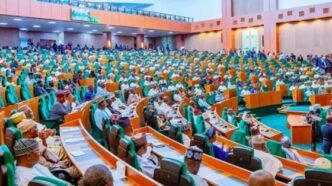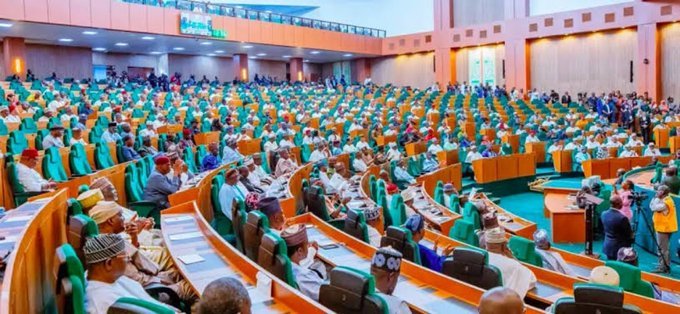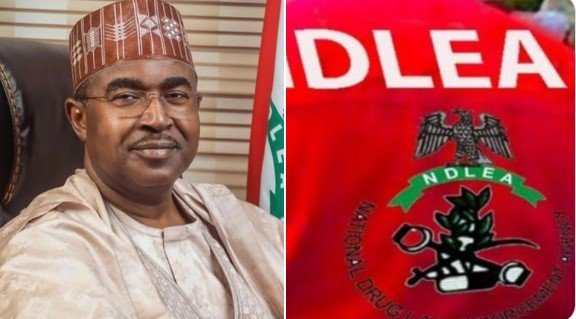Abuja, Nigeria — The House of Representatives has initiated a comprehensive investigation into the alleged utilisation of over N12 trillion by Nigeria’s Development Finance Institutions (DFIs) over the past seven years. In a related move, the House is also probing more than N20 trillion worth of abandoned federal government properties and projects, amid growing concerns about mismanagement, inefficiency, and fiscal accountability.
The announcement was made during plenary sessions on Wednesday, signaling a major parliamentary effort to enhance transparency and hold public institutions accountable for the stewardship of national resources.
Scope of the Investigation
The investigation is expected to focus on two major areas:
- Development Finance Institutions (DFIs): These government-backed financial institutions, which include the Bank of Industry (BOI), Nigerian Export-Import Bank (NEXIM), Nigerian Agricultural, Cooperative and Rural Development Bank (NACRDB), and others, are tasked with providing financing for key sectors such as industry, agriculture, and export promotion. The House is seeking clarity on the alleged disbursement, utilisation, and monitoring of over N12 trillion in loans and development funds over the last seven years.
- Abandoned Federal Government Projects and Properties: Reports indicate that the federal government has accumulated over N20 trillion worth of properties and projects that remain incomplete or abandoned, including infrastructure initiatives, housing schemes, and public facilities across the country. The House intends to determine why such assets remain unused and whether public funds have been mismanaged or diverted.
Reasons for the Probe
Lawmakers cited public outcry, audit irregularities, and concerns over financial accountability as the primary motivations for the investigation. The Speaker of the House emphasized that the probe is intended to ensure that government resources are properly utilised for national development, particularly given the critical role of DFIs in financing economic growth.
“We have a duty to our constituents to ensure that public funds are deployed effectively and transparently. This investigation will examine all DFIs and abandoned federal projects to determine accountability and recover any misappropriated resources,” a senior lawmaker said.
Expected Areas of Inquiry
The investigation is likely to cover several key aspects:
- Loan Disbursement and Recovery: Assessing whether DFIs followed proper procedures in approving loans and whether funds were repaid or recovered where necessary.
- Project Management: Examining the planning, execution, and oversight of federal projects to identify bottlenecks, mismanagement, or corruption.
- Asset Tracking: Determining the current status of abandoned properties and whether they can be rehabilitated or monetised for public benefit.
- Regulatory Compliance: Evaluating whether DFIs and relevant government agencies adhered to financial regulations, reporting standards, and auditing requirements.
Implications for Governance and Public Finance
Experts say the probe could have far-reaching implications for governance and public finance in Nigeria. The scrutiny of DFIs may reveal systemic weaknesses in project financing, loan recovery, and fund monitoring, which could prompt reforms aimed at improving efficiency and accountability.
“Development Finance Institutions are critical for Nigeria’s economic growth. However, if funds are not properly monitored or utilised, it undermines public trust and slows development,” said Dr. Chukwuma Nwankwo, a financial policy analyst.
Similarly, addressing abandoned federal projects could unlock billions of naira in potential value, providing opportunities for employment, housing, and infrastructure development if assets are rehabilitated or repurposed.
Potential Political and Legal Outcomes
While the investigation is primarily aimed at fact-finding, it could also lead to legislative recommendations, sanctions, or legal actions against institutions or individuals found culpable of mismanagement or corruption.
“The House has the power to summon officials, request documents, and make recommendations for prosecution if evidence of misuse of funds is discovered,” explained Mrs. Aisha Bello, a governance expert based in Abuja.
The investigation may also influence future budget allocations and oversight mechanisms, ensuring that DFIs and federal projects operate with greater transparency and efficiency.
Reaction from DFIs and Relevant Agencies
At the time of reporting, the management of key Development Finance Institutions had not issued official statements regarding the House probe. However, insiders suggest that agencies are preparing documentation and audit reports to respond to parliamentary queries.
The Federal Ministry of Finance is also expected to cooperate fully with the investigation, providing data on disbursements, project execution, and fund recovery processes.
Public and Civil Society Response
Civil society organizations and advocacy groups have welcomed the House’s initiative, describing it as a necessary step toward fiscal responsibility.
“For too long, billions of naira have been disbursed with little accountability. The investigation could set a precedent for transparency and better management of public funds in Nigeria,” said Mr. Tunde Fashola, head of a Lagos-based anti-corruption NGO.
The public is also watching closely, particularly given previous instances where mismanagement of public funds and abandoned projects have fueled discontent and undermined confidence in government institutions.
Next Steps in the Investigation
The House of Representatives has indicated that it will:
- Constitute a dedicated committee to oversee the investigation.
- Summon DFIs executives, project managers, and relevant officials to testify and provide records.
- Audit financial records and project documentation over the past seven years.
- Report findings and make recommendations for legislative action, policy reforms, or legal proceedings.
Lawmakers have stressed that the investigation will be conducted without bias, focusing solely on ensuring accountability and protecting the interests of Nigerian citizens.
Conclusion
The launch of this parliamentary investigation into the utilisation of N12 trillion by DFIs and N20 trillion in abandoned federal projects represents a critical step in Nigeria’s ongoing efforts to strengthen transparency, accountability, and public finance management.
The outcome of the probe could influence future governance, investment confidence, and economic policy, as well as provide opportunities to recover lost funds, rehabilitate stalled projects, and enhance national development.
As the investigation unfolds, Nigerians and stakeholders will be closely monitoring the process, emphasizing the need for objective reporting, swift action, and measurable results to ensure that public funds are used effectively for the nation’s benefit.














